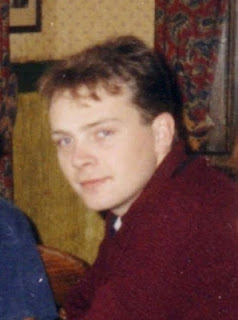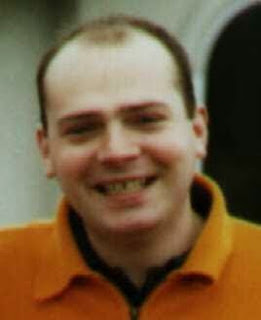"There may be times when we are powerless to prevent injustice, but
there must never be a time when we fail to protest." - Elie Wiesel, Nobel Lecture 1986
Not every foreign visitor to Cuba gets the royal reception Prince Charles and the Duchess of Cornwall had earlier this week. Others went to Cuba expecting a fun holiday or academic exchange but never returned home after enduring terrible conditions. This is what happened to a young Dane studying Spanish in Cuba.
Joachim Løvschall was studying Spanish in Havana in the spring of 1997. He was gunned down by a soldier of the Castro regime in Havana, Cuba twenty two years ago today on March 29, 1997. The identity of the soldier has never been revealed to Joachim''s family. No one has been brought to justice. The Løvschall family is not satisfied with the official explanation.
The last time they saw Joachim
On March 28, 1997 Joachim Løvschall ate his last dinner with white wine in a little restaurant called Aladin, located on 21st street in Havana. He went to the Revolutionary Plaza and bought a ticket to the Cuban National Theater. Following the performance he went to the theater's bar, Cafe Cantate, and met up with two Swedish friends. They each drank a couple of beers, but soon left because Joachim did not like the music. At 23:30, they said good bye to each other on the sidewalk in front of Cafe Cantate.
Joachim was never seen alive again.
The Castro regime's version of what happened
On September 28, 1997 the Danish newspaper Jyllands-Posten published an article by Kim Hundevadt titled "Dangerous Vacation" that outlined what happened to Joachim Løvschall and presented the Castro dictatorship's version of the events leading to this young man's death:
Twelve years ago
On June 12, 2007 Christian Løvschall, Joachim's father, at a parallel forum at the United Nations Human Rights Council spoke about his son's disappearance and the struggle to find out if Joachim was dead or alive:
Despite the claims made by the travel industry there have been other travelers to Cuba who have been killed or gone missing under suspicious circumstances.
 |
| Joachim Løvschall: December 7, 1970 - March 29, 1997 |
Joachim Løvschall was studying Spanish in Havana in the spring of 1997. He was gunned down by a soldier of the Castro regime in Havana, Cuba twenty two years ago today on March 29, 1997. The identity of the soldier has never been revealed to Joachim''s family. No one has been brought to justice. The Løvschall family is not satisfied with the official explanation.
The last time they saw Joachim
On March 28, 1997 Joachim Løvschall ate his last dinner with white wine in a little restaurant called Aladin, located on 21st street in Havana. He went to the Revolutionary Plaza and bought a ticket to the Cuban National Theater. Following the performance he went to the theater's bar, Cafe Cantate, and met up with two Swedish friends. They each drank a couple of beers, but soon left because Joachim did not like the music. At 23:30, they said good bye to each other on the sidewalk in front of Cafe Cantate.
Joachim was never seen alive again.
 |
| Weapon that was used to kill Joachim was an AK-47 |
The Castro regime's version of what happened
On September 28, 1997 the Danish newspaper Jyllands-Posten published an article by Kim Hundevadt titled "Dangerous Vacation" that outlined what happened to Joachim Løvschall and presented the Castro dictatorship's version of the events leading to this young man's death:
Around 23:30, a person matching Joachim Løvschall's description was in a bar named Segundo Dragon d'Oro. The bar lies in the hopeless part of town, around the Revolutionary Plaza which is dominated by ministry and other official buildings of harsh concrete architecture, and lies empty in at night.
At 2:45am he left the bar, after becoming intoxicated. Around 20 minutes later, he was walking down the Avenue Territorial, behind the Defense Ministry.
Joachim Løvschall walked, according to the Cuban authorities, first on the sidewalk that lies opposite the Ministry. Midway he crossed over to the other sidewalk, considered to be a military area, though it is not blocked off.
The Cubans have explained that Joachim Løvschall was shouted at by two armed guards, who in addition fired warning shots, which he did not react to. Therefore, one guard shot from the hip with an AK-47 rifle. The first shot hit Joachim in the stomach and got him to crumble down. The second shot hit slanting down the left side of the neck.
 |
| Joachim Løvschall gunned down in Cuba in 1997 |
On June 12, 2007 Christian Løvschall, Joachim's father, at a parallel forum at the United Nations Human Rights Council spoke about his son's disappearance and the struggle to find out if Joachim was dead or alive:
"Although the killing took place on the 29th of March, we only came to know about it on the 6th of April - i.e. after 8 days were we had the feeling that the Cuban authorities were unwilling to inform anything about the incident. Only because of good relations with Spanish speaking friends in other Latin American countries did we succeed in getting into contact with the family with whom Joachim stayed and the repeated message from their side was that they could reveal nothing, but that the situation had turned out very bad and that we had to come to Cuba as soon as possible. At the same time all contacts to the responsible authorities turned out negatively... Only after continued pressure from our side on the Cuban embassy in Copenhagen, things suddenly changed and the sad information was given to us by our local police on the evening of the 6th of April. We are, however, 100% convinced that had we not made use of our own contact and had we not continued our pressure on the embassy in Copenhagen, we might have faced a situation where Joachim would have been declared a missing person, a way out the Cuban authorities have been accused of applying in similar cases."Ten years later Christian Løvschall outlined what he knew concerning his son's untimely death:
We do feel we were (and still are) left with no answers except to maybe one of the following questions: Where, When, Who, Why Starting out with the where we were told that Joachim was killed by the soldiers outside the Ministry of Interior.
Where
What we do not understand is why no fence or signs did inform that this is a restricted area? I have been on the spot myself, and the place appears exactly like a normal residential area. So you may question whether this in fact was the place of the killing? Contrary to this the authorities keep maintaining that the area was properly sealed off, and the relevant sign posts were in place.
When
As to when Joachim was killed we only have the information received from the police because of the delay informing one might believe that this is another forgery made up to cover the truth.
Who
The who was in our opinion has never been answered by the Cuban authorities. We understand that a private soldier on duty was made responsible for the killing, and also it has been rumored that his officer in charge has been kept responsible. This is of course the easy way out, but why can't we get to know the whole and true story?
Why
Why did the soldiers have to fire two shots, one to his body and one to his head, to murder him? Was Joachim violent and did he, an unarmed individual, attack the armed soldiers? Or is it simply that the instruction to Cuban soldiers are: first you shoot and then you ask? But again: Who can explain why two shots were needed?





No comments:
Post a Comment